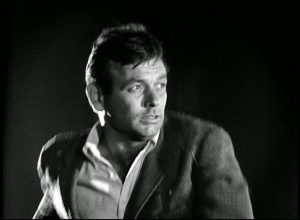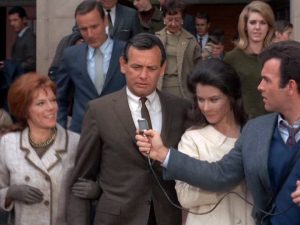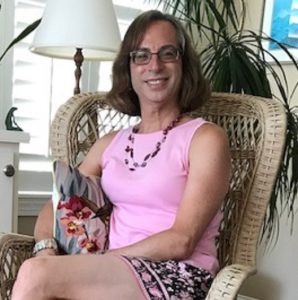Escapism
 When I first became an online DVD rental subscriber, I sampled classic TV shows from the 1950s and 1960s, before I was born. Some of the attraction included having a window to lost eras I will never see, however imperfectly depicted on the small screen. Occasionally encountering future stars in early roles was also a treat. The period styles had their appeal too. It was fun to imagine driving around town in a huge, chrome-accented vehicle (dollar gas?)—sporting a huge bouffant, and wearing a bright pastel-colored outfit with white gloves!
When I first became an online DVD rental subscriber, I sampled classic TV shows from the 1950s and 1960s, before I was born. Some of the attraction included having a window to lost eras I will never see, however imperfectly depicted on the small screen. Occasionally encountering future stars in early roles was also a treat. The period styles had their appeal too. It was fun to imagine driving around town in a huge, chrome-accented vehicle (dollar gas?)—sporting a huge bouffant, and wearing a bright pastel-colored outfit with white gloves!
That was the era of what I call Common Denominator TV. Before the growth of cable in the 1980s, there were only three major networks, and most homes owned only one television set. As a result, there could be (and often were) standards in broadcasting. Programs apparently respected their viewership, assumed it was reasonably intelligent, and took for granted that we all had much in common, despite our differences.
Today, with hundreds of networks, and multiple viewing devices per home, there are no standards–as we know all too well. Viewing audiences have become as fragmented as society at large, with little to nothing in common. Shows, networks and their advertisers care only about their specific target market segments, and have almost no regard for anyone and everyone else. A comparison of viewer ratings then and now appears to reflect this.
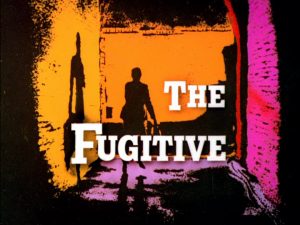 One of the classics I discovered and enjoyed was The Fugitive (1963-67). Some TGForum readers may recall this was a popular, well-crafted series with solid characters, suspenseful plots and thoughtful messages. Its four-season run straddled a key time period in American history—beginning as a black & white program at the twilight of Camelot, and concluding in full color during the Summer of Love,
One of the classics I discovered and enjoyed was The Fugitive (1963-67). Some TGForum readers may recall this was a popular, well-crafted series with solid characters, suspenseful plots and thoughtful messages. Its four-season run straddled a key time period in American history—beginning as a black & white program at the twilight of Camelot, and concluding in full color during the Summer of Love,
The late David Janssen absolutely nailed the title role. As Dr. Richard Kimble–a character falsely accused and convicted of murdering his wife–he perfectly portrayed the scared, hunted man who wanted very badly to trust people, but literally faced a death sentence if he was re-captured. Because he could not afford even one mistake, he was reserved and cautious in his public interaction.
Pursued by the duty-bound, humorless and increasingly obsessed policeman Lt. Gerard (Barry Morse), Kimble found himself hiding out in a different town among different people each episode, living and working in much reduced circumstances. So he tried very hard to simply be invisible, and avoid getting too close to anybody.
But this was a tall order; he was only human, after all. Plus, as a doctor, his skills were valuable, and he would often be in a position to help people in distress who had nowhere else to turn. This would get him noticed–often by a nosy resident who would then resent his presence, dig into his background, and expose him to danger.
Viewers followed the challenges of Dr. Kimble’s life on the run, as well as his search for a one-armed man that he had witnessed leaving the scene of his wife’s murder. Ultimately, in a dramatic series finale, Dr. Kimble located the real killer and gained the immense satisfaction of confronting him directly. The drama resolved with Kimble officially cleared of all wrongdoing, and his murder conviction rightly overturned.
This was arguably the first true series finale in American TV history, and it was a huge blockbuster–garnishing a still-unequaled 72 Nielsen rating, larger even than The Beatles’ debut performance on The Ed Sullivan Show in February 1964. It concluded with Dr. Kimble preparing to resume a free life, as series narrator William Conrad simply stated: “Tuesday, August 29th [1967]–the day the running stopped.”
A movie adaptation in 1993 starring Harrison Ford and Tommy Lee Jones was extremely successful, demonstrating that the storyline continued to resonate with mass audiences. In anticipation of the movie release, the original series finale was even rebroadcast on network television that year.
Despite the passage of time, the show itself has held up very well. It remains in syndication and is available for streaming, rental and purchase. And after enjoying several episodes of the show, I realized that–in a non-felonious way, at least–I could relate to the protagonist.
Like the fictional Dr. Kimble, I was a character with a secret. Unlike him, my secret was true life, and it began at an early age. Thankfully, I did not have millions of viewers following my actions. But I was constantly preoccupied with what might happen if my secret was exposed. I feared public ridicule and the potential loss of friends. And I did not have the ability to articulate even to myself just what my secret really was all about.
I too wanted to trust others, but for a long time I felt like I could not take the risk. For decades, I walled myself off from people who might have sensed something was there, and could have helped me. Exposure of my secret per se was obviously not going to send me to Death Row, or even land me in prison; however, the personal burden it imposed was crushing in its own way.
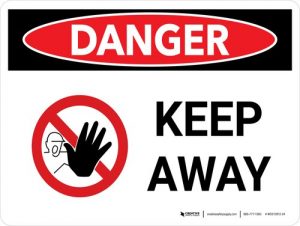 How could I possibly get truly close to anyone? A person might come to like me well enough, even become a good friend–but that could all go away in an instant if they really knew me, and what I was hiding from them. So why bother? Generally, I did not risk closeness. On those few occasions when I did, nothing meaningful ever seemed to result of it. A vicious circle existed–people did not find me approachable, and I did not let them approach me. Life was isolated and lonely.
How could I possibly get truly close to anyone? A person might come to like me well enough, even become a good friend–but that could all go away in an instant if they really knew me, and what I was hiding from them. So why bother? Generally, I did not risk closeness. On those few occasions when I did, nothing meaningful ever seemed to result of it. A vicious circle existed–people did not find me approachable, and I did not let them approach me. Life was isolated and lonely.
For so long, the people in my life basically knew an incomplete person. It was not the real me that I showed them. Instead, they were permitted to see the official me–an outward image only. Even if it was not literally a double life, what I led was something close. I was careful to conceal things that might have pointed people in the direction of my secret. (In retrospect, I think they perceived that all too well.)
But unlike Dr. Kimble, I had a choice as to whether or not to remain hidden. Eventually I chose to come out of hiding–gradually, but with increasing visibility, success and confidence. The official me began to give way to the authentic person that had always been present, but was never permitted to develop and be seen.
The response has been wonderful. It was like a light bulb went off, and everyone finally understood what I was all about after so many years. People actually appreciated being voluntarily let in on the secret, and are willing to get close to me. I feel like a more fully integrated human being. I can finally relax and have confidence that I am valued for my character–and not for some controlled public image I project.
Like Dr. Kimble, there has been clearance–and the running has stopped. It has been a great relief!
Like to make a comment? Login here and use the comment area below.
Category: Transgender Body & Soul


